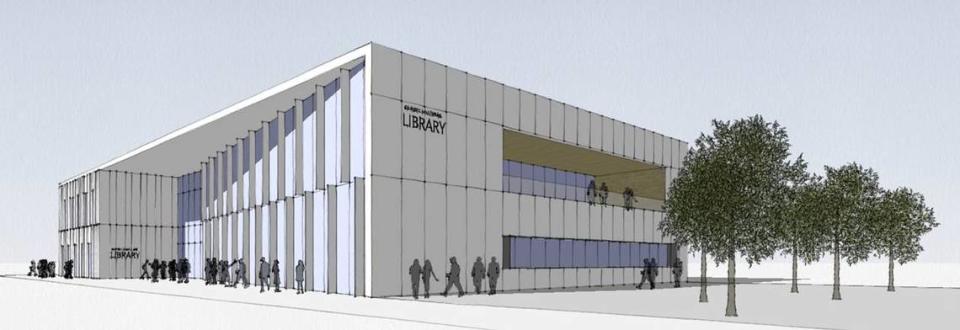Library, developer near deal to relocate north Charlotte branch after community outcry
The developer behind the revamp of a north Charlotte shopping center says his firm is nearing a deal with the Charlotte Mecklenburg Library to relocate the University City branch to his project.
After about a year and a half of negotiations, lawyers for the two parties are reviewing the newly proposed deal, said Greg Wattson, executive vice president of development at Dallas-based developer EB Arrow.
The University City Regional Library, the second busiest branch by circulation, currently leases land from Atrium Health, beside its University City hospital. The lease was set to expire at the end of last year, but the library negotiated an extension until Dec. 31, 2022.
Library spokeswoman Ann Stawski said in an email that no plans have been finalized, but that the site EB Arrow is developing is one of several under consideration.
University City Partners, a group that advocates for economic development in the area, has been pushing for the library to be located at EB Arrow’s development because of its location and proximity to the JW Clay Boulevard Blue Line station. The nonprofit led a campaign encouraging residents to write to Mecklenburg County leaders in favor of the location at EB Arrow’s site.
“We spent 1.2 billion in investment in building a Blue Line train line that moves thousands of people,” said Darlene Heater, the group’s executive director. “When you make that type of investment, you want to try to put all of these types of uses in transit stations or in walkable places to that train line.”
Cost versus accessibility
EB Arrow purchased the shopping center at North Tryon Street and West W.T. Harris Boulevard in 2018, and is planning apartments, a park along the small lake on-site, a trail and now the library for the project known as Waters Edge.
Wattson said the firm first suggested locating the library within an office building on-site, but it wasn’t able to secure financing for the office portion, especially as COVID-19 brought uncertainty to the market.
The library and his company went back and forth on various ideas, but eventually he said officials with the library suggested giving up the negotiations and moving to a site the county owned that was less accessible to transit.
Stawski said the library agrees that the central location, access to light-rail and broader development plans for Waters Edge make it an appealing site.
“The library works to ensure that all locations across our system are accessible for our community and likes the possibility of being located in close proximity to the light-rail line because of the access it would provide to those University City community members who most need library resources,” she said.
But she said there are other factors that are considered in its decision, such as cost.
Heater said she understands the library has to be responsible with taxpayers’ money, but she said the price tag should not be the driving force behind the decision, especially amid the increase attention to equity.
“We can build a library in the middle of a business park and it’ll check the box and it’ll be just fine,” she said. “But are we making the best decision for the folks who need to use the library to better their circumstances, or to enhance their literacy?
What comes next?
About six weeks ago, Wattson said after library leaders indicated they would move the branch elsewhere, he came up with a plan for the library to lease, and eventually have the option to buy, a 40,000-square-foot, two-story building on-site.
“We made a promise that we would incorporate (the library) into our development in some way,” he said. “And we were going to do everything in our power to find a solution to make that happen instead of just turning our back and saying ‘OK, it doesn’t work.”

Stawski said the library is “working through discussion points with EB Arrow.” She expects the library will have information to move forward on the relocation in the next few months. After that, the library would seek funding from the county, and conduct a community engagement process.
EB Arrow can complete the new facility before the library’s lease ends, Wattson said, but that doesn’t leave much more time for negotiations. And the project is nearly underway: Crescent Communities will start construction in April, he said, on the 308-unit apartment complex on the site.
Heater said she’s hopeful that an agreement will be reached, but she said not every developer will be willing to put so much effort into these types of discussions in the future.
Property values are generally higher along the light-rail line, resulting in a higher cost for taxpayers when the government purchases land there. But Heater said local leaders need to plan ahead to make sure that resources like libraries are a part of the plans for future development near mass transit.
“We’re going to have these scenarios all across our city and county as we continue to grow and build out transit and invest in communities that have not seen a lot of investment,” she said. “It’s important for us to at least have these discussions.”

